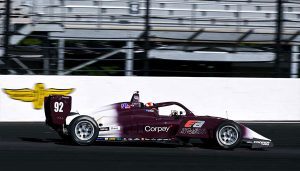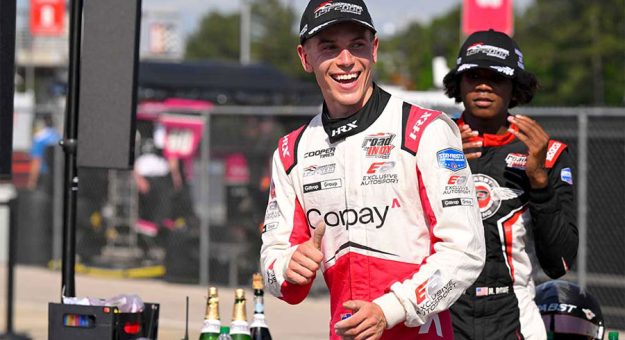As Billy Frazer stepped out of his truck, his eyes confirmed what his nose was telling him.
The truck’s brakes were on fire.
Quick thinking by Frazer and his father, Jim, led the pair to the fire extinguisher in the trailer the duo was towing as they were heading to Blairsville, Ga. With the fire snuffed out, there was the lingering uncertainty about the condition of the brakes.
The pair was about 30 minutes from their destination with some hilly sections of road ahead of them.
There was a gas station fewer than 10 minutes ahead of the pair, who drove slowly for a few minutes at a time trying to make sure the brakes were not catching fire again. After pulling into the station, Frazer asked permission from the employee working behind the counter to park their truck and trailer in the parking lot overnight.
The woman behind the counter gave her blessing, especially after the afternoon she had endured with a person dying of a drug overdose in the parking lot.
“She just said, ‘At this point, I’ve had a terrible day, you’re not robbing me, do what you like.’ She’d had a rough day and she was helping us out, which I really appreciated,” Frazer said.

The truck’s brakes were fixed soon after and the truck and trailer were back on the road, having spent the previous weekend in St. Petersburg, Fla., to start the USF2000 season. Towing a trailer around the country is not a normal life for a racer trying to advance up the motorsports ladder, but Frazer doesn’t regret the decision he and his family have made.
The New Zealand native figured it would be cheaper to drive a truck and tow a trailer around the country to live in, rather than pay rent and utilities for an apartment and then book flights, rental cars and accommodations to each race weekend throughout the season.
Frazer could park the trailer at each track with on-site camping and just walk to the paddock each day.
This is a direct contrast to 2021, when Frazer raced in USF2000 while renting an apartment in Brownsburg, Ind., a suburb on the west side of Indianapolis.
Frazer and his family purchased a 2003 Ford F-150 with 270,000 miles on it to tow a 2017 Fun Finder trailer they purchased from Camping World in Tampa. The trailer experience got off to a rocky start almost immediately as Frazer and his father drove the trailer from Tampa to Miami for the Road to Indy preseason tests at Homestead-Miami Speedway.
A trailer tire blew on the highway and the tire quickly shredded away, leaving a trail of sparks behind the trailer.
The damage from the blowout cut every electrical and propane line underneath the trailer and required the Frazers to use unconventional methods to raise the trailer high enough to change the blown tire.
“We were actually stacking the Walmart weights that I used to train underneath the jack in order to get it raised,” Frazer said. “You know, just these big concrete plates, and, yeah, tough (going) with another week without gas or power in the trailer until insurance came through and got it fixed for us.”
After everything was all fixed up, the father-son duo got the racing season started in St. Petersburg with Frazer scoring second- and sixth-place finishes in the first two USF2000 races of the season in the No. 92 Exclusive Autosport machine.
As Frazer and his father were preparing to leave St. Petersburg, a gentleman who had camped near them in the same RV park approached the pair and had a nearly 20-minute conversation with the duo.
He had been a volunteer corner marshal in the past and loved Frazer’s story so much that the gentleman gave Frazer $100 toward his racing. He knew the money wouldn’t cover much, but he loved Frazer’s story and had recognized him through the weekend as a driver who had done well.
That $100 won’t buy a set of tires, but any small donation helps toward getting the car on track, whether it be cash like that or a Meyer Shank Racing mechanic allowing Frazer to park the trailer for free in a camping spot that the mechanic owns in a Georgia campground.
The first step in becoming a race car driver is securing a racing budget that covers entry fees, tires, brakes, fuel, oil, testing, crash damage (heaven forbid) and team personnel. Seats on the Road to Indy are almost all entirely driver-funded and some drivers in the various series have little to no cushion built into their budgets for crash damage.
If a driver has multiple incidents early in the season, that driver may be out of a ride by the time the midway point of the schedule rolls around.
Winning the USF2000 title earns the driver a scholarship check to move up to the Indy Pro 2000 Championship.
Winning the Indy Pro 2000 title gives that driver another scholarship check to move up to Indy Lights. Winning the Indy Lights title gives that driver one more scholarship check that is good for at least three IndyCar races, including the Indianapolis 500.
Each championship in the Road to Indy has a more powerful car as a driver progresses up the ladder system, but the budget required to run that more powerful car in each championship also increases.
The 2019-’20 New Zealand Formula Ford champion used this money-saving rationale for living in a trailer, which has forced Frazer to live quite a bit differently than in his old apartment.
The satellite dish used for TV service picks up different stations across the country based on where the trailer is parked. The internet comes from a hotspot with unlimited data and Frazer has had to learn how to cook healthy meals for himself to save money instead of getting takeout during the week.
While Frazer will tow the trailer to almost every USF2000 race weekend, one event he will not take the trailer to will be Toronto. With the complications of a border crossing and the logistics of parking the trailer near Canada’s most populous city is a situation Frazer will avoid, at least for this season.
However, Frazer will be taking the trailer out to Portland, Ore., for the final race weekend of the season, using the GPS from his phone to guide him out west with podcasts to help pass the time.
Of course, what Frazer’s phone can’t do is maneuver the trailer around when the F-150 needs more fuel to keep going. The truck uses gasoline instead of diesel and finding a station that has enough room for the truck and trailer to move around can require some luck.
“And then, obviously, if you can’t get into that gas station, you’ve got to find a way to turn around and get back up onto the freeway. So I don’t think we’ve had the fuel light on too many times, but for sure there’s been one or two (occasions) where it’s kind of got to the lift and coast phase,” Frazer said with a light chuckle.
After the season is over, a decision has to be made since Frazer has a scholarship to attend Indiana University-Purdue University Indianapolis where he will study mechanical/motorsports engineering. Moving into a residence hall is an option as Frazer continues his education, but staying in the trailer is also an option.
“I think mom and dad have actually really enjoyed the trailer, so I don’t think that’s something they want to pass on,” Frazer said. “So whether we can find somewhere to pull it up or lease out something like that, but yeah, it’s definitely handy to have and it it’s worked really well.”
Frazer started racing on the bottom step of the Road to Indy last year, scoring a pair of top-five finishes en route to finishing 12th in the points. This year, Frazer’s campaign has been one of feast or famine.
At deadline, Frazer was fourth in USF2000 points with three runner-up finishes and two third-place finishes to go along with a 17th at Barber Motorsports Park and a 12th at Road America.
Winning the USF2000 title for Exclusive Autosport would give the Canadian-based squad its first championship on the Road to Indy.
The USF2000 championship has 18 races spread over various IndyCar race weekends on road courses, street circuits and the lone oval race at Lucas Oil Indianapolis Raceway Park.
